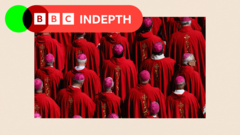The pre-conclave gatherings show a mix of support for Pope Francis's legacy and concerns about his approaches, leading to an upcoming pivotal election.
The Tensions Within the Vatican: Preparing for the Next Conclave

The Tensions Within the Vatican: Preparing for the Next Conclave
As cardinals prepare to choose the next pope, internal divides and differing visions for the Church come to the forefront.
In anticipation of the conclave to elect a new pope, the Vatican's Santa Marta guesthouse is preparing to host 133 cardinals, who will make history by selecting the next leader of the Roman Catholic Church. One suite remains locked, evoking the memory of Pope Francis, who passed away on Easter Monday. His extensive influence over the Church and the appointments of around 80% of the voting cardinals set a significant backdrop for this conclave.
The Church's direction under the late pope focused on inclusivity and outreach to the marginalized, thus prompting discussions regarding whether his progressive stance should be continued or re-evaluated. Cardinals’ conversations leading up to the conclave have revealed a mix of enthusiasm for building on Francis's work and skepticism from more traditional factions. As the cardinal's opinions meld together, the question of reconciling these divergent views looms large.
This conclave marks a historic moment, not only for its unprecedented representation of diverse nations, including the likes of South Sudan and Rwanda, but also for the critical discussions taking place amongst cardinals from varying backgrounds. The unique intersection of viewpoints underscores the varied challenges the church faces worldwide—ranging from shrinking congregations in Europe to the fight against poverty in Africa and Asia.
Beyond the spiritual responsibilities tied to leading a global faith, the new pope must navigate politics effectively. Comments from influential voices, including the British ambassador to the Holy See, illustrate the Vatican's unexpected sway in international affairs—despite its small size. Pope Francis excelled in this domain, leveraging his platform to advocate for peace and address social issues that resonated beyond Catholic purviews, winning followers across faiths and cultures.
Despite overall support for Francis previous efforts, many cardinals express concerns about the clarity of his vision and how to manage church governance moving forward. The challenges of addressing sexual abuse and financial corruption must be balanced with fostering an inclusive dialogue within the Church, aiming to give laypeople a more significant voice.
Finding consensus will be crucial, especially after a divided response within the Church ranks during Francis's leadership. Voices in favor of traditional Church teachings have felt marginalized, but the poignant themes discussed during his funeral—human dignity, environmental responsibility, and peace—indicate a stronger need for unity.
With the cardinals set to deliberate amidst an atmosphere of potential rancor and hope for continuity, the task remains: locating a spiritual leader who can unify the Church while still addressing pressing global issues and internal complexities. Ultimately, as they convene in the sacred setting of the Sistine Chapel, the cardinals will be reminded to seek guidance from the divine in the quest for their new leader.
The Church's direction under the late pope focused on inclusivity and outreach to the marginalized, thus prompting discussions regarding whether his progressive stance should be continued or re-evaluated. Cardinals’ conversations leading up to the conclave have revealed a mix of enthusiasm for building on Francis's work and skepticism from more traditional factions. As the cardinal's opinions meld together, the question of reconciling these divergent views looms large.
This conclave marks a historic moment, not only for its unprecedented representation of diverse nations, including the likes of South Sudan and Rwanda, but also for the critical discussions taking place amongst cardinals from varying backgrounds. The unique intersection of viewpoints underscores the varied challenges the church faces worldwide—ranging from shrinking congregations in Europe to the fight against poverty in Africa and Asia.
Beyond the spiritual responsibilities tied to leading a global faith, the new pope must navigate politics effectively. Comments from influential voices, including the British ambassador to the Holy See, illustrate the Vatican's unexpected sway in international affairs—despite its small size. Pope Francis excelled in this domain, leveraging his platform to advocate for peace and address social issues that resonated beyond Catholic purviews, winning followers across faiths and cultures.
Despite overall support for Francis previous efforts, many cardinals express concerns about the clarity of his vision and how to manage church governance moving forward. The challenges of addressing sexual abuse and financial corruption must be balanced with fostering an inclusive dialogue within the Church, aiming to give laypeople a more significant voice.
Finding consensus will be crucial, especially after a divided response within the Church ranks during Francis's leadership. Voices in favor of traditional Church teachings have felt marginalized, but the poignant themes discussed during his funeral—human dignity, environmental responsibility, and peace—indicate a stronger need for unity.
With the cardinals set to deliberate amidst an atmosphere of potential rancor and hope for continuity, the task remains: locating a spiritual leader who can unify the Church while still addressing pressing global issues and internal complexities. Ultimately, as they convene in the sacred setting of the Sistine Chapel, the cardinals will be reminded to seek guidance from the divine in the quest for their new leader.






















